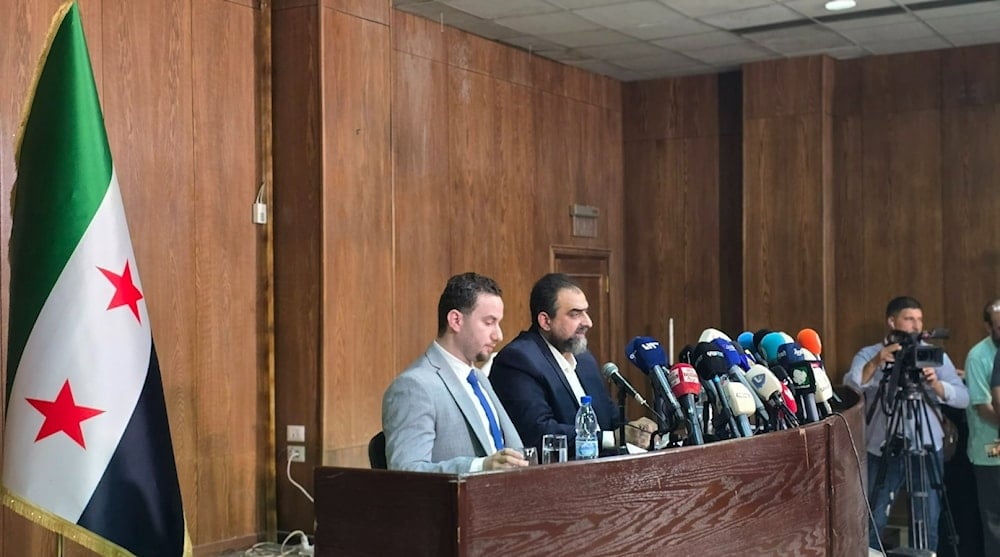Damascus authorities free ex-officers in 'push for civil peace'
Damascus has released several military officers as part of a broader transitional justice effort, according to Hassan Soufan, a member of the High Committee for the Preservation of Civil Peace.
-

Hassan Soufan, member of Syria’s High Committee for the Preservation of Civil Peace, speaks during a press conference in Damascus, announcing the release of officers under transitional justice efforts (@YMSafadi)
Damascus authorities have released several military officers as part of a broader national effort to promote what they described as "civil peace" and "initiate transitional justice", according to Hassan Soufan, a member of the High Committee for the Preservation of Civil Peace.
In a press conference held Tuesday at the interim Ministry of Information in Damascus, Soufan stated that the officers released had been active since 2021 and had voluntarily surrendered at the Iraqi border and in the Al-Sukhna area, under what is known as a "case of seeking amnesty."
"The detainees were subjected to official investigations, and no charges of committing war crimes were proven against them," Soufan said. "Their continued detention does not serve the national interest and lacks legal legitimacy."
Fragile transition
The releases come amid a profound shift in Syria’s political landscape. Following the ouster of former President Bashar al-Assad in late 2024, an interim government led by Ahmed al‑Sharaa has assumed power, ushering in a new era marked by both political realignment and significant ideological change.
Unlike the former secular Ba'athist regime, the current leadership includes Islamist-aligned figures and has signaled openness to normalizing relations with "Israel".
However, the transition has been marred by widespread sectarian violence, particularly targeting Alawite communities perceived to be aligned with the former government. Human rights groups have documented mass killings and reprisal attacks across Latakia, Tartus, and Homs, prompting calls for independent investigations. The new leadership has faced scrutiny for its role, or failure to prevent these acts.
Peace priority
Soufan noted that the recent officer releases are part of a broader process and "do not replace the path of transitional justice, which has already begun under the supervision of the National Committee for Transitional Justice, established by presidential decree."
He credited individuals like Fadi Saqr for playing a role in "facilitating procedures and resolving security complications," and urged the public to "understand the feelings of the families of the martyrs despite the difficult decisions needed to ensure stability in the upcoming phase."
While both the security and judicial tracks are progressing, Soufan said, "the priority now is the civil peace track, as it provides the necessary foundation for any strategic reforms." He also noted that additional steps are being prepared and would be announced in due course. However, he warned that "the current turbulent atmosphere does not allow for real stability," and stressed "the importance of working away from the media on certain sensitive files."
Justice caution
Soufan said that the committee had formally requested exceptional powers from the President of the Republic, which include authorizing the release of detainees who have not been proven guilty. "Transitional justice does not mean punishing everyone who served the regime," he said, "but rather focuses on holding perpetrators of major crimes accountable."
He cautioned against unilateral or hasty implementation of transitional justice measures, warning that it "would lead to chaos and portray the state as incapable," potentially opening the door to foreign interference.
Read more: Al-Sharaa open to political settlement with 'Israel'
Addressing the deeper objectives of the process, Soufan stated, "Vengeance and retaliation do not achieve transitional justice but rather lead to the loss of truth." He affirmed that "the releases were conducted within the committee’s mandate," while responsibilities such as pursuing kidnapping cases "remain under the state's jurisdiction."
He concluded by underscoring the broader vision behind these steps: "Societal reconciliation is a steadfast path not measured by immediate outcomes but aims to calmly quell discord and ensure sustainable stability."

 4 Min Read
4 Min Read










